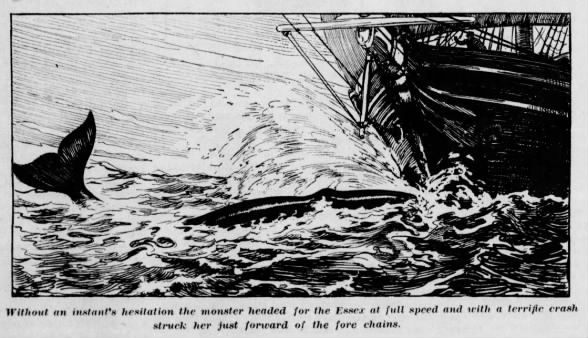 A Whale Sinks the Essex Sun, Feb 27, 1916 – Page 65 · St. Louis Post-Dispatch (St. Louis, St. Louis, Missouri, United States of America) · Newspapers.com
A Whale Sinks the Essex Sun, Feb 27, 1916 – Page 65 · St. Louis Post-Dispatch (St. Louis, St. Louis, Missouri, United States of America) · Newspapers.com
Some already know this story; those who saw 2015’s In the Heart of the Sea will have even watched it play out on the big screen. But for many, the true and horrific tale of the Essex shipwreck has only been seen in fictional fragments through the novel it inspired, Moby Dick.
Moby Dick ends with a whale-induced shipwreck; the true story begins with one.
The Wreck
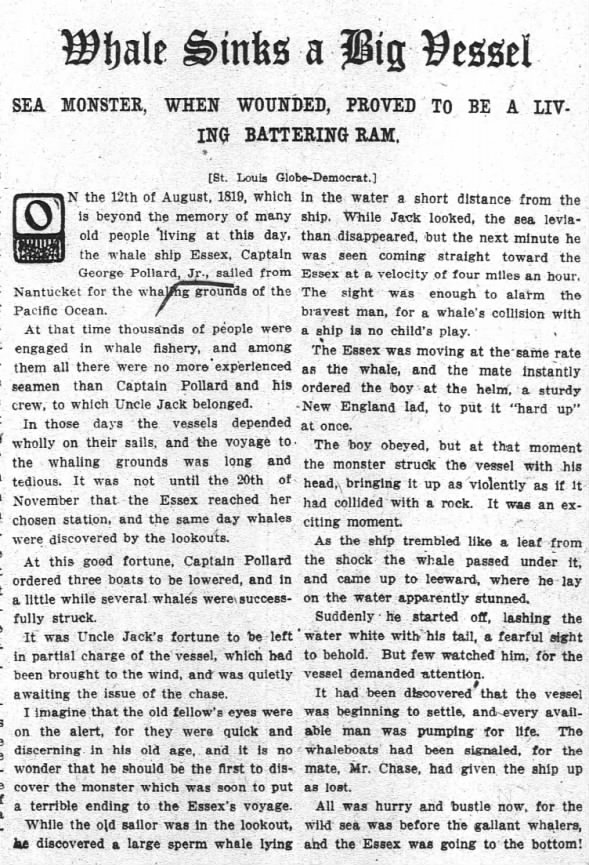 Whale sinks a big vessel Sun, Jul 4, 1915 – Page 4 · The Washington Post (Washington, District of Columbia) · Newspapers.com
Whale sinks a big vessel Sun, Jul 4, 1915 – Page 4 · The Washington Post (Washington, District of Columbia) · Newspapers.com
Though “Uncle Jack” may be a fictional embellishment in the article above, the shipwreck caused by the whale’s attack was very much real. It took place on November 20, 1820, and was only the beginning of the horrors faced by the crew of the foundered Essex. Twenty men divided themselves between three boats and deliberated on what should be done next. One boat was commanded by Captain Pollard, one by first mate Owen Chase, and the third by second mate Matthew Joy.
Lost at Sea
In a decision that will read as decidedly ironic to those who know the history, the crew decided against the shorter and easier route west to the Marquesas islands for fear of encountering cannibals. Instead they opted to travel east with hopes of reaching South America, though the journey would be twice as long, with currents and winds working against them.
After surviving nearly a month on the provisions they had hastily taken from the sinking Essex, all three boats landed on what they thought was Ducie Island. It didn’t take long to realize the island’s scant resources would not support them for long. They set sail again one week later, though three men opted to stay behind and take their chances on the island. Captain Pollard also left behind a letter with hopes that it would be sent on to his family if the men were recovered.
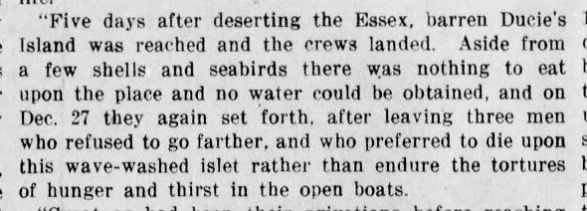 Three men remained on Ducie’s Island (Essex disaster) Sun, Feb 27, 1916 – Page 65 · St. Louis Post-Dispatch (St. Louis, St. Louis, Missouri, United States of America) · Newspapers.com
Three men remained on Ducie’s Island (Essex disaster) Sun, Feb 27, 1916 – Page 65 · St. Louis Post-Dispatch (St. Louis, St. Louis, Missouri, United States of America) · Newspapers.com
Dire Straits
This is where the details become especially grim.
The boat captained by Owen Chase was separated from the other two in a squall on January 11th. Two of the men on board perished in the days following; the first was slipped into the sea to rest, but the second was eaten by the starving men who remained. On February 18th Chase’s boat, containing three survivors, spotted a British vessel, the Indian.
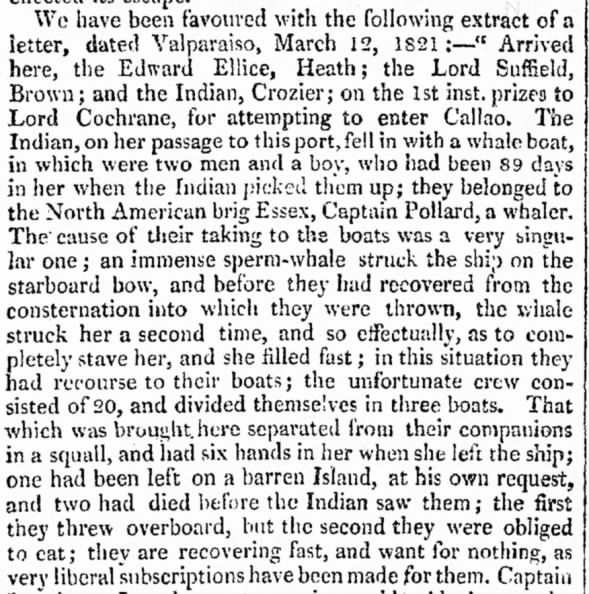 Second boat picked up with three survivors (Essex disaster) Sat, Aug 4, 1821 – 2 · The Bristol Mercury and Daily Post, Western Countries and South Wales Advertiser (Bristol, Bristol, England) · Newspapers.com
Second boat picked up with three survivors (Essex disaster) Sat, Aug 4, 1821 – 2 · The Bristol Mercury and Daily Post, Western Countries and South Wales Advertiser (Bristol, Bristol, England) · Newspapers.com
The other two boats were separated from each other not long after. One, with three men still living, was never seen again. The second held Captain Pollard, his young cousin Owen Coffin, and two other crew members. With starvation a very real and looming threat, a difficult choice was made:
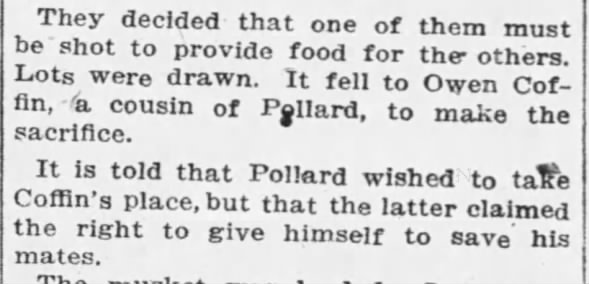 Owen Coffin killed to save the others (Essex disaster) Sat, Sep 10, 1921 – 6 · The Boston Globe (Boston, Suffolk, Massachusetts, United States of America) · Newspapers.com
Owen Coffin killed to save the others (Essex disaster) Sat, Sep 10, 1921 – 6 · The Boston Globe (Boston, Suffolk, Massachusetts, United States of America) · Newspapers.com
With the sustenance provided by Coffin and a second man who died a few days later, Pollard and the remaining crewman Charles Ramsdell survived long enough to be recovered by an American whaling ship, the Dauphin, on February 23, 1821.
On April 9th the three men who stayed on Ducie Island (which turned out to be Henderson Island) were recovered, still miraculously alive. Of the twenty men who had sailed away from the wreckage of the Essex, only eight survived. Owen Chase’s account of the experience would be the inspiration for Herman Melville’s famous American novel, along with many other stories and films.
Find more on this incredible piece of history with a search on Newspapers.com.
Like this post? Try one of these:


Interesting. It sort of makes one reconsider the meaning of being a guest at the Captain’s table. God forbid being considered as the guest of honor!
For sure. LOL
xbt abirf